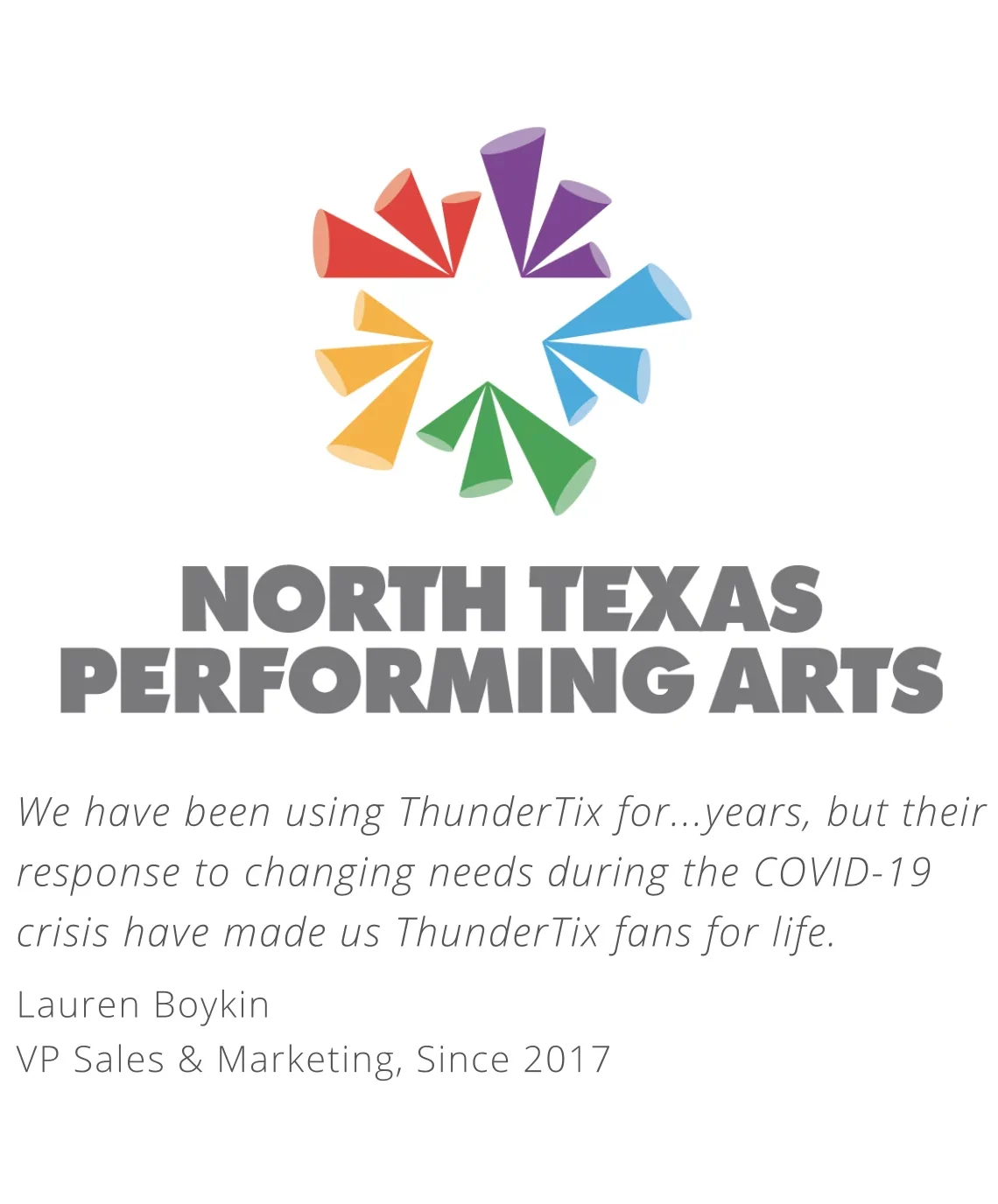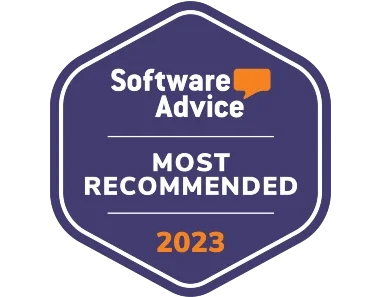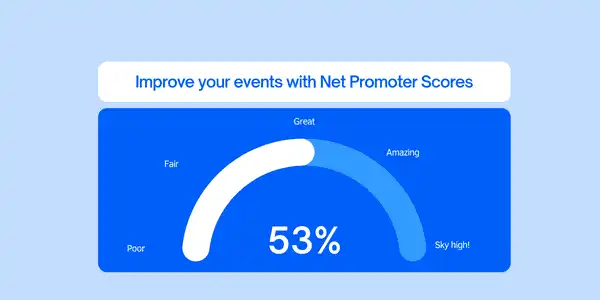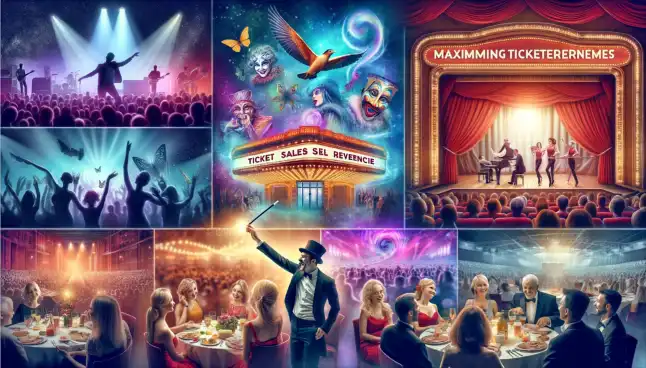RESPONSIVE DESIGN
Be a hero to your tech-challenged patrons and users with a very friendly interface that makes purchases and administration easy. Simply the easiest choice for customers.
ALL-IN-ONE PLATFORM
Harness the power of ticketing, fundraising, concessions, and loyalty with patron metrics and your own private CRM. Your box office staff will love the ease-of-use!
INTELLIGENT MASS EMAIL
Create beautiful, customizable email in reusable templates that automates
mass mail campaigns. Send renewals and payment reminders at prescheduled intervals.
Get clear patron insights with a full view of purchasing histories, seat preferences, donations, and even favorite beverages.
What makes the best box office software? It starts with clear data, includes automation in emails, renewals, recurring donations, and it ends with a robust system that is a joy to use. Understand why ThunderTix earned the moniker "best box office software" for all live performance venues.
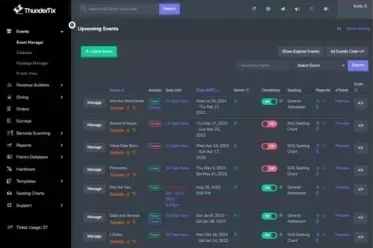
One-click box office functionality
In addition to being lightning fast for rapid order processing at the box office, we minimize clicks and show you all event information on one page. Click to modify makes ThunderTix user friendly and fast.
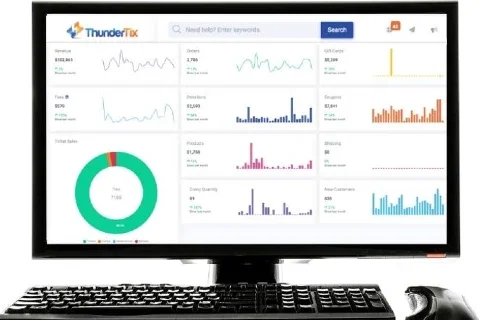
Real-time sales dashboard
Receive nightly or weekly sales data via email, or get your birds-eye view of new customers, ticket sales or donations earned. Compare month over month or custom periods and view graphed results.
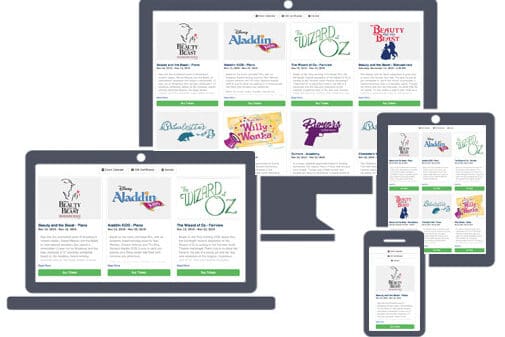
Responsive, user-friendly design
Most ticket sales happen on a mobile device, so we have automated tests to ensure we never break the purchase process! Since many of our performing arts theatres serve mature audiences, we built it to be easy peasy!
All-in-one automation saves time and money
Remaining the best box office software means we perform updates every single day of the year. Many of those are unique game changers like automated membership renewals, and others are tiny improvements that make the site easier to use, save time, and save money.
Concessions and Merchandise
Sell food and drinks as pre-orders prior to the show or at the concession stand. Upsell merchandise with ticket sales or from the merch table.
Fundraising Tools
We prompt patrons to make small donations by rounding up purchases. Then follow up with automated "snail mail" thank you letters.
Built-in Email Functionality
Use Mailchimp, Constant Contact or our own built-in email for automatic event reminders, post-event surveys, or mass mail communication using customizable templates.
Create Events in Minutes
A huge part of our efforts are aimed at making your work easy. Create events and ticket pricing in under 5 minutes. Then wrap those into season passes in 10 minutes.
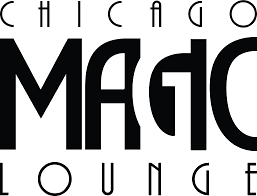
Lounge

Performing Arts
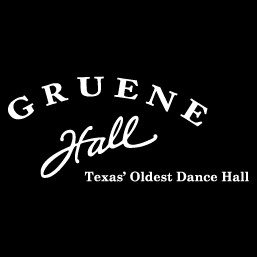
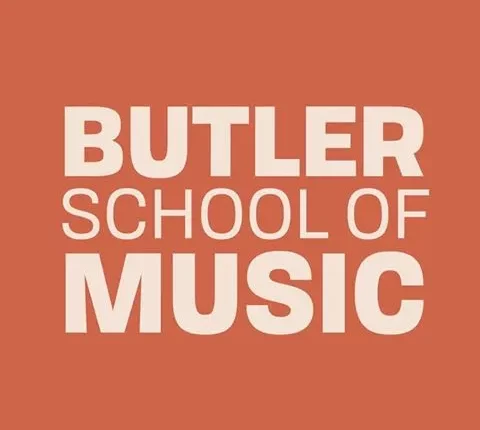
Case Study: Stellar Customer Service
Founded in 1991 in Plano, Texas, North Texas Performing Arts (NTPA) brings the arts to youth through six theatre troups in the Dallas/Plano area. With1,000 performances annually, NTPA relies on ThunderTix's tech-friendly interface and video tutorials for their large staff of volunteers. To NTPA, these easy-peasy features clearly make ThunderTix the best box office software.
During the height of the pandemic, ThunderTix showed their customer commitment by rapidly building an array of features that helped NTPA navigate social distancing with automatic seat blocking and the ability to retain revenues with gift card refunds during a wave of cancellations.
DIFFERENCE FROM PREVIOUS TICKETING SERVICE
NTPA ougrew the limits of Woo Commerce as they expanded to 5 different venues. "In 2016 we were doing paper tickets. Cutting them and handing them out. That was crazy to me. It was a massive upgrade. Instantly received well by families and staff."
FLEXIBLE CODEFAVORITE FEATURE
NTPA LOVES the self-service abilties for change requests on ticket orders. Their customers perform their own exchanges, refund requests, and even convert their purchases to a donation when they're unable to attend performances. This is a huge time-saving feature for both staff and customers!
BENEFITS THEY CAN'T LIVE WITHOUT
Fine-grained control of user permissions enables NTPA to create unlimited logins with specific oversiight. Coupons and flex passes track comped orders, and the resulting reports provide details for grant requests and ensure comps are distributed equitably.
WHY THUNDERTIX IS THE BEST BOX OFFICE SOFTWARE
The feature requests provides a way to share your ideas and vote on others. "We have put in several that have come to fruition."
The "round up" feature for donations at the time of purchase is signfificant. "We get a ton of donations through that prompt and love it."
With ThunderTix, you gain a team.
Don't take our word for it - here's what our clients say:
"Their team truly listens to what their users want. It is as though we are building the software together. You can tell the people behind the program truly care about it and about our business. ThunderTix is not just a software program - it is a community. And whenever I get lost [they] respond within minutes...That's what I like best about ThunderTix: knowing that they have my back."

Melanie R.
GM, Shakespeare on the Sask
"Simple to use. Simple to integrate. Simple to get support. Simple to get feature requests evaluated and even implemented. We switched from a significantly more expensive platform. The conversion was trivial....I'm a fan....Granted when reps of the company came through town...they took my wife and I to lunch...They are just that doggone good. You're through shopping. Hit 'buy now'."

Jason R.
Founder, Rover Dramawerks
"Our organization is a small, 100% volunteer community theatre. Without staff, using a software that has a million bells and whistles but takes months to master just wasn't an option for us. ThunderTix was immediately very easy to use.
Their support is awesome and they take recommendations and bug reports really seriously. It sort of has a "local business" feel to it."

Renae P.
President, Town & Gown Theatre
Start a free trial! It only takes a minute.
Rated the most recomended best box office software for features, functionality and price!
Independent review sites support what we've been feeling for a long time -- we are simply the best. We invite you to read all of our phenomenal reviews, because nobody speaks better than your peers.
It's all about events and tickets!
Learn about the latest trends in event ticketing along with new features for your box office.
How Mobile Wallets Provide Convenience Ticketing for Live Events
What are mobile wallets? When it comes to live events where the ease of access and seamless experiences can significantly enhance customer satisfaction, convenience is king. A ThunderTix, we’ve adopted[…]
Read moreUnlocking Audience Insights: The Power of Net Promoter Scores in Live Events
In the world of performing arts and live events, understanding your audience is not just a part of the job—it’s the essence of success. Whether it’s a breathtaking ballet, an[…]
Read moreHow to Maximize Ticket Revenue in 2024: Strategies for Live Entertainment Venues
9 actionable methods to increase ticket revenue The close of one year allows us to reflect on our performance while eagerly anticipating new processes to implement in the upcoming new[…]
Read moreAutomate season pass and membership
renewals, seat assignments and more!
Fully automate your membership and season packages and include
all of the benefits you always offered -- discounts, merchandise, and VIP seating.
